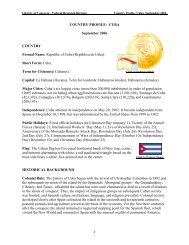1 - American Memory
1 - American Memory
1 - American Memory
You also want an ePaper? Increase the reach of your titles
YUMPU automatically turns print PDFs into web optimized ePapers that Google loves.
aoo<br />
lose important industrial customers, who have turned elsewhere for<br />
their supplies.<br />
THE INADEQUACY OF EXISTING REMEDIES<br />
Existing remedies for Hawaii in the event of west coast shipping<br />
tieups are inadequate. For example, the Taft-Hartley Labor-Manage-<br />
ment Relations Act has been employed 12 times in national emergency<br />
disputes in the longshore and maritime industries since its enactment<br />
in 1947. The results have been dismal. Only one of the nine longshore<br />
and two of the three maritime disputes were settled during the 80-day<br />
cooling-off period provided by the act once an injunction was obtained<br />
in court.<br />
Considering the west coast alone, Taft-Hartley has been invoked<br />
only four times in shipping disputes and only twice did it lead to set-<br />
tlement there.<br />
Because an emergency must be national in scope to qualify for a<br />
Taft-Hartley injunction, the act was not employed in the 1971-72<br />
west coast longshore strike until after 100 days had elapsed, until after<br />
extensive economic injury had spread as far as the Middle West farm<br />
belt, and until after a strike by the International Longshoremen's As-<br />
sociation on the east and gulf coasts had closed down those other<br />
mainland ocean ports. When it finally was used, Taft-Hartley proved<br />
a towering failure. Although the injunction period was twice volun-<br />
tarily extended by consent of the parties, the west coast longshore<br />
strike ultimately resumed for 34 more days.<br />
In another instance, the 41-day west coast Masters, Mates and Pi-<br />
lots strike of late 1972, Taft-Hartley again could not be used because<br />
the stoppage was not deemed a national emergency.<br />
I would like to a.ssure the members of the subcommittee, on behalf<br />
of the people of Hawaii, that it can be just as painful to be caught in a<br />
"regional" emergency as a "national" one.<br />
PROMISES OF CONGRESSIONAL ACTION ARE INADEQUATE<br />
Despite Hawaii's near-total dependence on maritime shipping and<br />
despite the all-too-frequent shipping disruptions, any relief from Con-<br />
gress is available only on an ad hoc basis.<br />
Tlie people of Hawaii and their representatives in the Senate and<br />
House have learned that an ad hoc congressional response to a strike<br />
emergency affecting their State can be very slow and requires an extra-<br />
ordinary combination of circumstances.<br />
As you will recall from my previous testimony before this subcom-<br />
mittee, we of Hawaii have tried on many occasions and through many<br />
means to resolve our dilemma on a permanent basis, but not imtil this<br />
vear has it been possible to pass remedial legislation in either the<br />
Senate or House.<br />
As a matter of fact, the enactment of legislation requiring compul-<br />
sory arbitration of the 1971-72 west coast longshore strike, which<br />
virtually compeled a voluntary settlement by the parties themselves,<br />
furnishes recent evidence of Congress' lack of readiness to deal with<br />
critical stoppages. Congressional action came (1) only after the dock-



![Albert Einstein Papers [finding aid]. Library of Congress. [PDF ...](https://img.yumpu.com/21604228/1/190x245/albert-einstein-papers-finding-aid-library-of-congress-pdf-.jpg?quality=85)





![American Colony in Jerusalem Collection [finding aid]. Library of ...](https://img.yumpu.com/17941275/1/190x245/american-colony-in-jerusalem-collection-finding-aid-library-of-.jpg?quality=85)



![Piccard Family Papers [finding aid]. - American Memory - Library of ...](https://img.yumpu.com/17941234/1/190x245/piccard-family-papers-finding-aid-american-memory-library-of-.jpg?quality=85)


